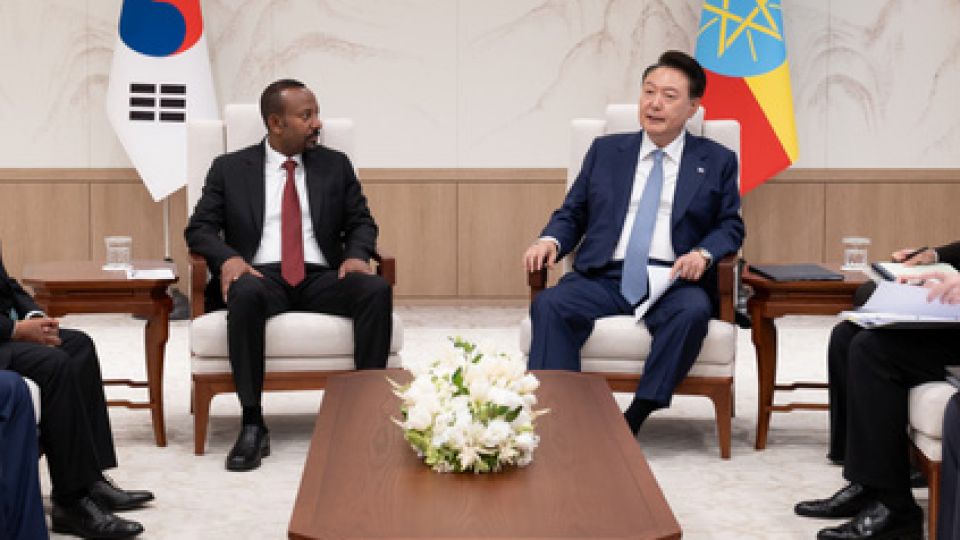June 3, 2024
SEOUL – President Yoon Suk Yeol on Sunday held two rounds of bilateral talks with Tanzanian President Samia Suluhu Hassan and Ethiopian Prime Minister Abiy Ahmed Ali, respectively, on the sidelines of the 2024 Korea-Africa Summit scheduled for later this week in Seoul.
Seoul described the meetings as a stepping-stone for Asia’s fourth-largest economy to weather the transnational crises through increased strategic cooperation with the African continent.
The Korean president and Hassan held a summit-level working lunch at Yoon’s office in Yongsan-gu, Seoul on Sunday, according to the presidential office. This followed Hassan writing in the guestbook and a pact-signing ceremony.
According to Yoon’s office, the two nations initiated talks over the Economic Partnership Agreement to diversify trade goods. The two leaders also acknowledged South Korea’s $2.5 billion commitment to Tanzania through the Korea Economic Development Cooperation Fund by 2028 to help improve living conditions and boost economic growth for Tanzania. The two also signed memorandums of understanding, including one meant for Tanzania’s stable supply of key materials to South Korea.
South Korea established diplomatic ties with Tanzania in April 1992.
Later in the evening, Yoon and Abiy met at a separate summit-level working dinner in the presidential office, according to Seoul.
South Korea and Ethiopia established diplomatic ties in December 1963. Ethiopia was the only African country to have sent combat troops to counter North Korea’s invasion of South Korea in the 1950-53 Korean War.
Yoon and Abiy acknowledged the signing of the Trade and Investment Promotion Framework between the two countries in October last year, as well as South Korea’s $1 billion commitment through the Korea Economic Development Cooperation Fund extending through 2028, according to Yoon’s office. The two also discussed South Korea’s projects to set up a power grid, build roads and refurbish rivers in Ethiopia. They additionally expressed hopes concerning mining development and defense equipment deals.
Earlier on Friday, Yoon held formal talks with Sierra Leone’s President Julius Maada Bio, during which the two leaders discussed ways to boost bilateral relations to help the African country achieve growth in its national economy, agriculture and education, according to Yoon’s office.
Bio thanked Yoon for South Korea’s contribution to Sierra Leone’s growth through projects to allow women greater access to secondary education, to enhance digital education infrastructure and to donate medical equipment.
In return, Yoon asked Bio that they closely coordinate with each other as nonpermanent members of the United Nations Security Council, particularly in addressing UN sanctions on North Korea and the regime’s human rights problem. Both South Korea and Sierra Leone are now serving two-year terms as nonpermanent UN Security Council member nations.
Following Bio, Hassan and Abiy, Mauritanian President Mohamed Ould Ghazouani will be the fourth African leader to pay an official visit to South Korea on the margins of the 2024 Korea-Africa Summit, Seoul’s first multilateral meeting with African leaders of its kind.
Bio, Hassan, Abiy and Ghazouani are to be among 25 African heads of state Yoon is scheduled to meet from late May through early June.
According to Yoon’s office, 48 African countries will send a delegation to Seoul for what it considers the largest multilateral summit for Yoon to host since his inauguration in May 2022.
According to the presidential office, delegations of all African countries are attending the conference, except for six out of the 55 member states of the African Union whose memberships are suspended due to internal turmoil and that for the disputed territory of Western Sahara.
A separate meeting of foreign ministers was held Sunday at the Four Seasons Hotel in Seoul to discuss preparations for the Korea-Africa Summit event.
Meanwhile, authorities in Seoul and neighboring Gyeonggi Province said they will implement special measures to reduce traffic congestion on Tuesday and Wednesday. Public-sector employees will come under the effect of a road space rationing program to reduce traffic levels to half, and their office hours will be delayed by an hour. Private-sector companies may also take part in the odd-even driving restriction policy.
According to police in Seoul, roads in Seoul’s central districts of Jung-gu and Yongsan-gu, as well as expressways along the Han River — Gangbyeonbukro and Olympic-daero — will likely experience partial traffic jams during the Korea-Africa summit period. Some 2,200 police officers will be dispatched to alleviate traffic congestion.


